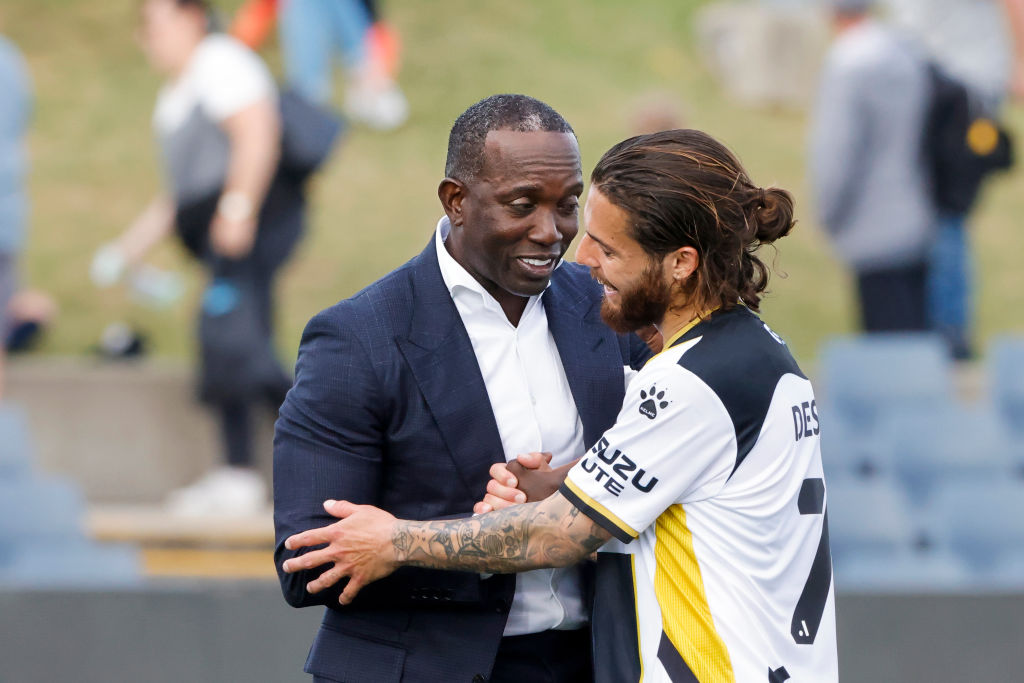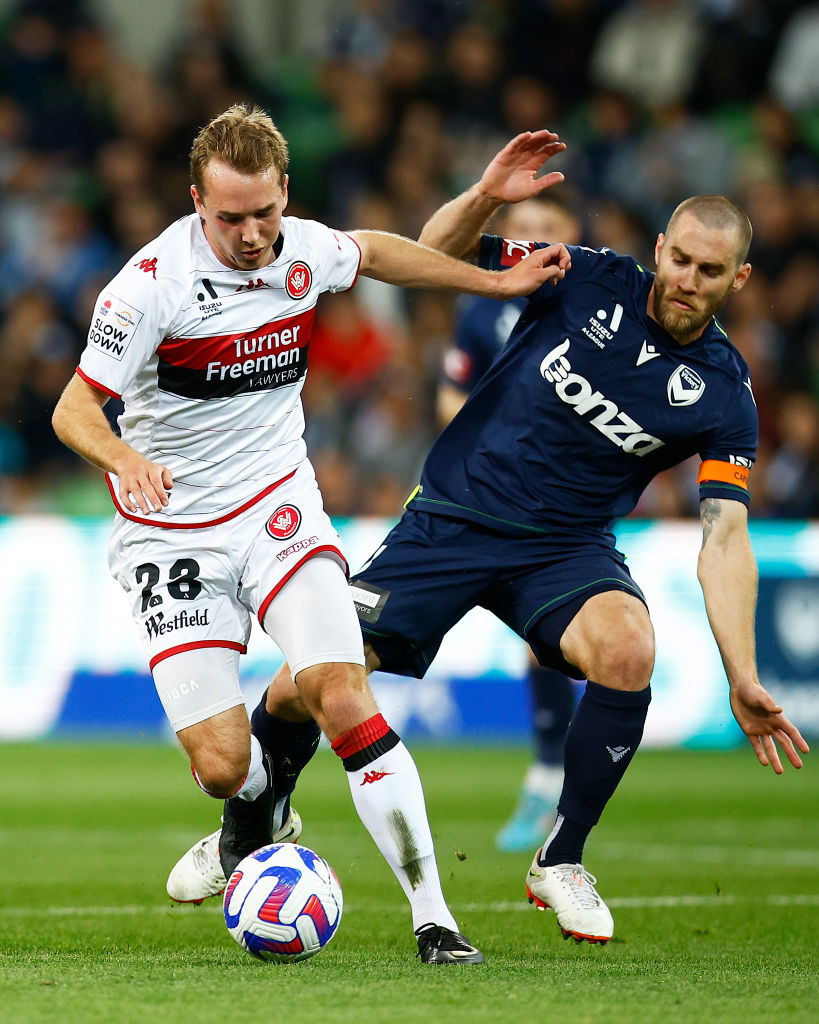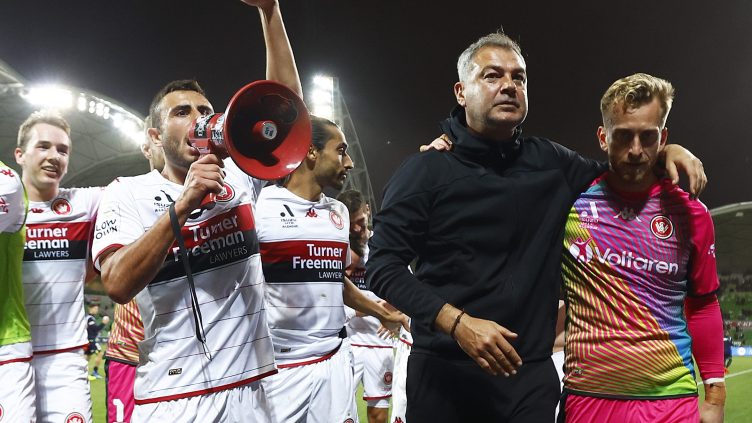Two rounds of the Isuzu UTE A-League reveal the teams shedding blood, sweat and tears to make themselves the toughest opponents, writes Tom Smithies.
The oath of ethics that all doctors sign is founded on the principle of Primum non nocere – “first, do no harm”. Football coaches tend to start with something similar: first, do not lose.
Iconoclasts like Ange Postecoglou might disagree, but for most coaches the avoidance of defeat is the first building block in creating a team. From a selfish point of view, coaches who don’t lose will stay longer in a job; for their team, not losing takes them a long way towards winning.
NEDS WEEKEND PREVIEW: THE MELBOURNE DERBY SHAPING AS A SOCCEROOS AUDITION
Already, two rounds into the A-League Men season, you can see the evidence of coaches seeking to make previously porous teams rather tougher to beat. Perhaps most obviously, Western Sydney Wanderers have started the season with two wins but as importantly, two clean sheets; it would be hard to argue that they are particularly convincing going forward, but the holes that made Western Sydney too often resemble a block of Swiss cheese have so far been filled.
Some 45 minutes’ drive away, Macarthur FC under Dwight Yorke are also turning into the sort of well-marshalled construct that is hard to break down, conceding two goals in seven games in the Australia Cup and Isuzu UTE A-League. As an alumni of the cut-throat elite of European football, Yorke knows only too well the principle of building success on avoiding failure.

Compare that all with last year’s champions, Western United, whose progress was for most of last season built on a miserly defence. The concession of five goals in their first two games of this campaign is the worst possible way to start a title defence.
Context is everything in how you view the coaches who are trying to focus on the foundations by lavishing mortar between the bricks. Marko Rudan has said very little in public about aspirations for this season precisely because every Western Sydney campaign since 2017 has begun with optimism before collapsing in on itself. Only once since Tony Popovic quit the Wanderers in 2017 has the side finished with a positive goal difference, and then by a margin of just two goals.
The fans are desperate for a return to the success of the Popovic years, but the carousel of coaches who have sought to deliver it – and haven’t – shows the pressure on Rudan to get it right. In those circumstances, the fans will take early positive results built on perspiration as much as inspiration in a heartbeat.
In fact a conversation in pre-season with a player at another club was revealing. He had played against Wanderers signing Romain Amalfitano previously overseas, and rated him highly – “he’s a good player, but he’s tough too. He’ll do well.” You can see that common thread in a number of Rudan’s signings, from Milos Ninkovic to the club’s new captain, Marcelo. All are obviously technical players, but mentally hardened too and unlikely to wilt under the weight of expectation.
In the midst of it all is a 21-year-old Australian with just 570 minutes of A-League experience before this season, but who might just become one of the key figures for the Wanderers this season. Calem Nieuwenhof was highly regarded at rivals Sydney FC but saw his progress stymied by injury.
Nieuwenhof opted for a fresh start this season, controversially heading across town, and has been trusted by Rudan to sit at the base of his team’s midfield. The result so far, albeit on the limited data from two rounds of football, has been a league-high 10 successful tackles (more than three times as many as anyone at Brisbane Roar, Western Sydney’s opponents on Saturday). He also has had more touches than any of his teammates, and made more passes than all bar Marcelo.

One by one, these are the ingredients of a team that’s hard to breach; smart players who won’t go hiding, who win their personal battles and understand the structure. It’s a similar story at Macarthur, where a seemingly attack-heavy team has been well-drilled in working as a team. In a conversation on the eve of the season, Yorke was pretty direct in describing the lack of any of that when he arrived.
“There was a prime example even in that game (against Oakleigh Cannons in the semifinal of the Australia Cup) where we’re winning 5-1 and we’re still trying to score when you should just be like, ‘OK, now let’s just express ourselves, give them the runaround, pass it nice and keep control,” he said. “This is when you take control over the whole game and dictate to the (other) team – but we were still going forward!”
That’s the core of it again. Don’t concede, don’t leave yourself open. Be hard to beat even when you’re 5-1 up.
Long term, particularly at a club like the Wanderers, not losing isn’t enough. Perhaps as early as this game against Brisbane, Rudan will have to loosen the reins and let his side play with more adventure (and by definition, with more risk). But foundations matter, in football building as much as house renovations.





